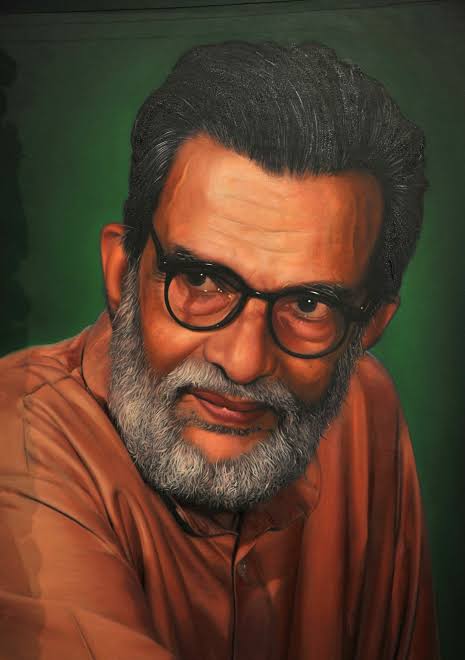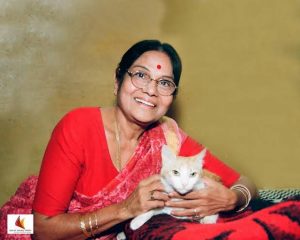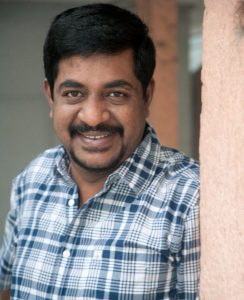
Babukodi Venkataramana Karanth widely known as B. V. Karanth was an Indian film director, playwright, actor, screenwriter, composer, and dramatist known for his works in the Kannada theatre, Kannada cinema, and Hindi cinema. One of the pioneers of the Parallel Cinema, Karanth was an alumnus of the National School of Drama (1962) and later, its Director. He received the Sangeet Natak Akademi Award (1976), six National Film Awards, and the civilian honor Padma Shri for his contributions towards the field of art.
Born into a Kannada speaking family of Manchi, a village near Babukodi in Bantwal taluk of Dakshina Kannada district in 1929, Karanth’s passion for theatre started at an early age. His first tryst with theatre was when he was in standard III – he acted in Nanna Gopala, a play directed by P.K. Narayana. He then ran away from home and joined the legendary Gubbi Veeranna drama company where he worked alongside Rajkumar who also was starting out then as a novice.
Gubbi Veeranna sent Karanth to Banaras to gain a Master of Arts degree, where he also underwent training in Hindustani music under Guru Omkarnath Thakur. Thereafter, along with his wife, Prema Karanth, Karanth set up “Benaka”, one of Bangalore’s oldest theatre groups. It is an acronym for Bengalooru Nagara Kalavidaru. Then, Prema took up a teaching job in Delhi and supported Karanth through the National School of Drama. He was to return the compliment after he graduated from the NSD, and eventually became its director. He later graduated from the National School of Drama (NSD), New Delhi, in 1962, then headed by Ebrahim Alkazi. Between 1969 and 1972, he worked as a drama instructor at the Sardar Patel Vidyalaya, New Delhi after which the couple returned to Bangalore. Here Karanth dabbled in some cinema as well as music and was involved with the likes of Girish Karnad and U.R. Ananthamurthy in these ventures. He then returned to the NSD, this time as its Director in 1977.
As the director of NSD, Karanth took theatre to far-flung corners of India. He conducted several workshops in places as far away as Madurai in Tamil Nadu. After his stint as the director of NSD, the Madhya Pradesh government invited him to head the Rangamandal repertory under the aegis of the Bharat Bhavan. After rendering yeoman service to the theatre scene in Madhya Pradesh between 1981 and ’86, Karanth returned to Karnataka. In 1989, the Karnataka government invited him to set up a repertory in Mysore, which he named Rangayana and headed until 1995. He was diagnosed with prostate cancer in the late 1990s and died at 8 p.m. on 1 September 2002 in a private hospital in Bangalore.
His translations from Sanskrit into Hindi include Swapna Vasavadatta, Uttararama Charita and Mrichchakatika . He has also translated a large number of plays from Kannada to Hindi and vice versa. His translation of Girish Karnad’s play Tughlaq into Hindi/Urdu has attained cult status. Karanth entered the Kannada theatre scene in the late 1960s and early ’70s. His entry brought about a sea change in Kannada theatre which then was steeped in the old, formal proscenium style. His plays like Jokumara Swamy, Sankranti, Huchu Kudure and Oedipus to name a few, which were directed in the early 1970s, were hailed as trendsetters. These plays touched upon all aspects of theatre like language, music, song, stylisation.
The innovative use of music was one Karanth’s biggest contributions to theatre. One of Karanth’s strengths was his ability to draw on classical, traditional and folk forms and fuse them in his compositions. His plays were less famous for design as for their musical content, which became part of the prose of theatre.” In 2010, at the 12th Bharat Rang Mahotsav, the annual theatre festival of National School of Drama, Delhi, a tribute exhibition dedicated to life, works and theatre of B.V. Karanth and Habib Tanvir was displayed. Jnanpith awardee Nirmal Verma had once described Karanth as “the authentic desi genius of Indian theatre”



